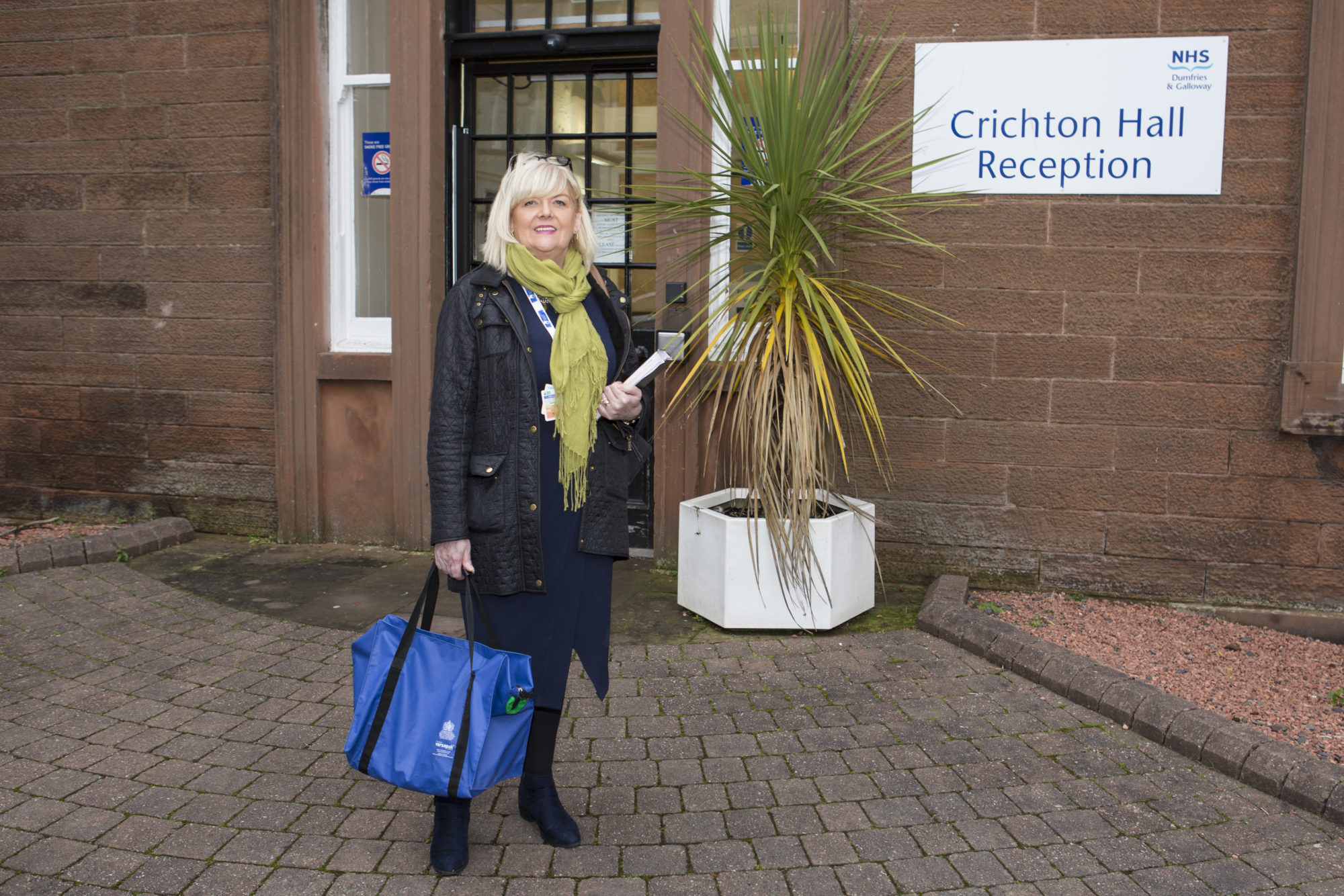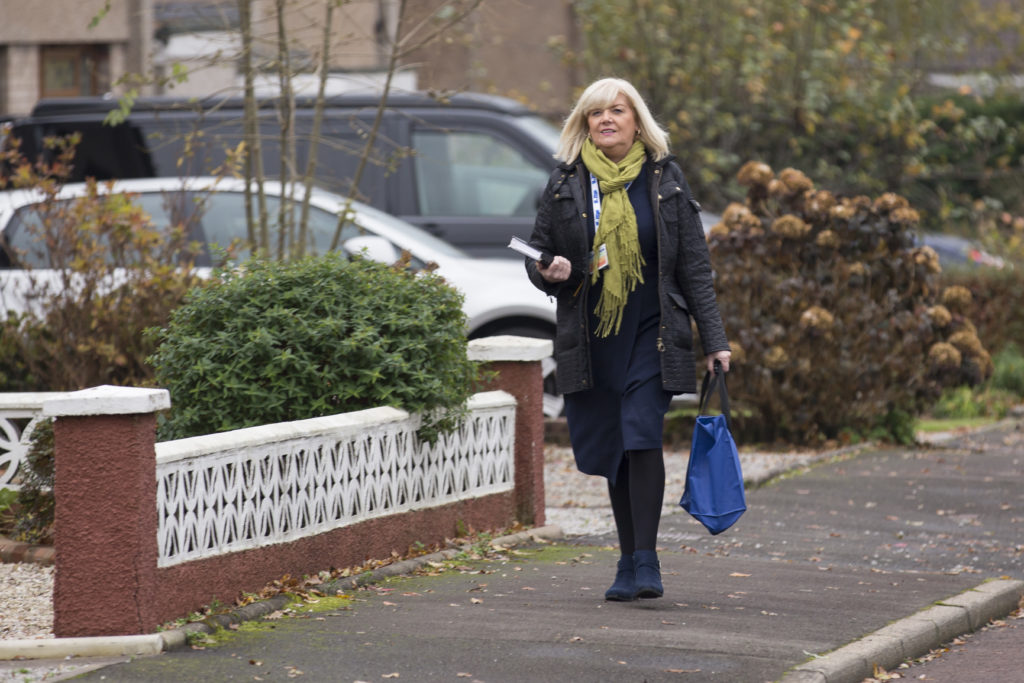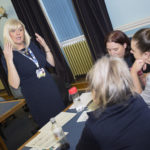Lorraine Haining

Specialist Nurse Practitioner Lorraine Haining has been leading a multidisciplinary dementia team from her base in Dumfries since 2012.
As a small child, I attended nursery at a very early age. The nursery nurses wore very traditional nurses’ uniforms with aprons, cuffs and hats. The matron in charge wore a very old-fashioned matron’s hat just like you would see in the TV programme The Royal. I can remember I had a favourite called Nurse Maureen and I am convinced that I went into the nursing profession myself because of the early influence she had on me.
After my nurse training I worked in adult mental health for a number of years, but I always knew my real enthusiasm was working with older people. For the last 18 years I have worked in the field of dementia in the community in a variety of roles including as a community psychiatric nurse, in research, training and management, and as the head of dementia services in a retirement village. My current job as the lead nurse for the IDEAS (Interventions for Dementia, Education, Assessment and Support) team at NHS Dumfries and Galloway is the perfect fit for me as it is a combination of clinical work and educating others. I feel like all the roles I’ve had in the past have led me to this – it is my ideal job and I just love it.
Every day is very different. The services the IDEAS team covers include nursing, occupational therapy, psychology, speech and language therapy and social work. Initially, the remit was to support local care homes to improve the quality of life for people with dementia experiencing stress and distress with a focus on non-pharmacological approaches. But permanent funding was secured after a successful pilot and the team of five’s work was rolled out to be available to any setting where a person with dementia spends time.
A big part of my day to day work is training. The other members of the team and I provide a range of training around dementia at different levels to anyone out in the community. It could be care homes, carers, district nurses, social workers – it’s quite mixed.
Our primary role is helping people to manage stress and distress in dementia. The main dimensions of the service are a training programme, individual consultations and ongoing support to implement training into practice. Over 2,000 staff across the region have attended the training programme, with a reduction in use of antipsychotics and benzodiazepines, an increase in non-pharmalogical approaches and a reduction of distress of caregivers (professional and family) in the community.
We also have a clinical caseload – we will pick up cases where the stress and distress is quite complex and we will work with those involved in their care. We work alongside them all to unpick what the underlying problem is and address this in a person-centred way, formulating it into a care plan.
I see my community as being people with dementia and their families and anyone involved in their care. Our team has definitely made a huge difference to this community – we raise awareness and bring knowledge and empowerment. There are much better skills in the workforce because people have come to the training and really embraced it.
A lot of what we do is quite complex and there is a lot of unpicking to do. We are very dependent on other organisations collaborating with us – which is great because you build up good relationships with people. That is key to getting things done.
The idea is to eliminate, or at least reduce, the stress and distress the person is experiencing in their journey in dementia so they have good wellbeing. We try to encourage non pharmacological approaches, so things like music, getting outdoors, activities – we see they work much better. The idea is that you can have somebody who can go through a journey of dementia and live well.
I believe the Queen’s Nurse Award would add prestige to the field of dementia nursing and encourage more nurses to take up opportunities to work in this specialism. I believe my role provides a very good option in retaining a clinical role, with some managerial responsibility but also a service development aspect.
The issue for development I initially outlined was about supporting staff in the care homes to put their learning into practice, but this changed early on in my Queen’s Nurse journey. During my time on the week-long residential at Balbirnie, I found the experience incredible in terms of nurturing and re-energising my passion for nursing. We spent time being creative, and when we were asked to make a model of our project, it was then I realised that the issue I had picked was too broad and I realised that it needed to be centred on staff and their psychological needs. How can we ask staff to provide person-centred care if we don’t treat them in accordance with this very philosophy?

I decided to use our IDEAS team Facebook page to start an Appreciative Friday where we thank staff and family carers for their dedication and support to people to people with dementia that week and offer them a positive affirmation of some description to encourage them to value their roles and their worth in terms of the work they undertake on a daily basis.
This was combined by asking staff and families to help me to create a dementia love blanket to represent the fact that people with dementia, their carers and staff need to be wrapped up in this blanket and comforted and nurtured when things get tough. The uptake of this exceeded my expectations – I obtained more than 2,500 knitted or crocheted squares. These were real labours of love sent from people with dementia, carers, staff and even the general public. The message being, if we are all wrapped up as one it feels like we are in it together and there for each other.
Lorraine Haining has recently been named Dementia Nurse Consultant with Erskine.





